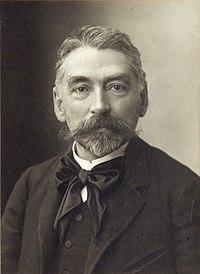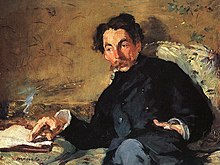Stéphane Mallarmé
Stéphane Mallarmé [ stefan malaʁ'me ] (born March 18, 1842 in Paris as Étienne Mallarmé ; † September 9, 1898 in Valvins, municipality of Vulaines-sur-Seine , Seine-et-Marne department , near Fontainebleau ) was a French writer .
His poems are considered major works of symbolism . Together with Charles Baudelaire , Paul Verlaine and Arthur Rimbaud , he is considered one of the most important pioneers of modern poetry .
Life
Mallarmé was born into a family of civil servants from Sens in Paris. After his mother died in 1847, he grew up with his grandparents. From 1850 he lived in boarding schools, was dismissed in 1855 for bad behavior and from 1856 attended a boarding school in Sens. In 1857 his younger sister died. The first poems were written between 1858 and 1860 (64 poems under the title Entre quatre murs , German between four walls ). Shortly after graduating from high school, he met the poets Emmanuel des Essarts , Jean Lahor and Eugène Lefébure and made friends with them. During this time he also dealt with Charles Baudelaire's Les Fleurs du Mal for the first time and published his first literary-critical articles in numerous different magazines, and later also his first own poems. He met the German nanny Marie Gerhard from Camberg , at that time the Duchy of Nassau , whom he married in England in 1863, before taking up a job as an English teacher in Tournon-sur-Rhône (a job he would pursue until his retirement in 1893) . In 1863 his daughter Geneviève was born. His friends and acquaintances at this time included the félibres Théodore Aubanel , Joseph Roumanille and Frédéric Mistral , who write in the Provencal language , as well as Catulle Mendès and Auguste Villiers de L'Isle-Adam .
In a personal and artistic crisis, he began his “life project” Hérodiade in 1864 , in which he thematized the search for the purity and beauty of poetry in an adaptation of the biblical Salome material. He wrote his long poem L'après-midi d'un faune , which eventually comprised 110 Alexandrians , from 1865 in the hope of having it performed at the Théâtre Français in Paris, but this was rejected. In 1866 he was able to publish ten poems for the first time in the magazine Le Parnasse Contemporain of the important group of poets of the Parnassians around Théophile Gautier , whose view of literature he initially shared. Among his acquaintances were Leconte de Lisle and José-Maria de Heredia . He moved several times: in 1866 to Besançon , where he began correspondence with Paul Verlaine , and in 1867 to Avignon , from where he began to publish his prose poems .
In July 1871 his son Anatole was born in Sens. Shortly afterwards, Mallarmé made the long-awaited move from the provinces to the capital Paris. During this time he worked a. a. in translations of the works of Edgar Allan Poe . In 1872 he met the young poet Arthur Rimbaud , and from 1873 he increasingly dealt with Impressionism , stimulated by his friendship with the painter Édouard Manet . He also met Émile Zola through Manet. In 1874 he published some issues of the magazine La dernière Mode , of which he was the sole editor, without success . Previously rejected several times by publishers, an edition of L'après-midi d'un faune was published in 1876 with illustrations by Manet.
Since 1877 Mallarmé organized his soon-to-be-known Mardis (Tuesday meeting), at which he spent years young poets such as Émile Verhaeren , Maurice Maeterlinck , Oscar Wilde , Joris-Karl Huysmans , Paul Valéry , André Gide , WB Yeats , Rainer Maria Rilke and Stefan George in in his apartment in the Rue de Rome. In 1878 he met Victor Hugo .
His student Paul Valéry said: "Mallarmé lived for a very specific thought: he was obsessed with the idea of an absolute work, which for him was the highest goal, the justification of his existence, the only purpose and the only meaning of the universe."
In 1879 his son Anatole died in childhood. In 1883 Mallarmé's work was brought closer to a wider public through Verlaines Poètes maudits . From 1884 to 1889 he had a friendship and love affair with Méry Laurent . In 1886 he published his first poem without punctuation, M'introduire dans ton histoire , and was elected Prince des Poètes the same year after Verlaine's death . After his retirement he moved to Valvins in 1894, where he worked on various literary and theoretical projects for several years and died in 1898. He was buried in the Samoreau cemetery ( Seine-et-Marne department ).
Character and meaning

By reading Hegel , Mallarmé came to the conclusion that if “heaven is dead”, nothing must be the starting point for the beautiful and the ideal. In his opinion, this philosophy included a new type of poetry in terms of rhythm , sentence structure and vocabulary . Going beyond the L'art pour l'art of the poets around Gautier, he sees in the poetic language of a poésie pure ( pure poetry ) the only way to advance to pure ideas . Mallarmé rejected the realistic, descriptive lyric poetry of realism , rather he regarded suggestion as the basis of the new poetry.

As symbolism refers to his views resembled literature the Impressionism in the visual arts . Due to the extreme expression of the suggestive language in Mallarmé's work, he was also called "the most symbolist of the symbolists". As a innovator of French poetry , Mallarmé's influence continues to this day. His doubts about the traditional function of language made him a pioneer of modern poetry. Many of his ideas were later taken up again by representatives of Dadaism , Surrealism , Futurism and Deconstructivism (such as Jacques Derrida ).
Due to the often intentionally unclear style and the subtle relationship between writing, sound and meaning, his work is considered difficult to translate. When reading aloud, associations and meanings become audible that are not obvious in the written form, for example the words “ses purs ongles” (“their pure nails”) can be heard as “c'est pur son” (“that is pure sound ") Should be understood.
Not least the tonal, musical quality of Mallarmé's language inspired important composers to set his works to music. A major work of musical impressionism is Claude Debussy's Prelude à l'après-midi d'un faune for orchestra (1894), freely composed after Mallarmé, which Mallarmé was enthusiastic about and wrote in a letter to Debussy: Your illustration of “Après-midi d 'un Faune' does not create a dissonance to my text, it truly surpasses it in yearning and light, with its delicacy, its melancholy, its richness. In 1912 Vaslav Nijinsky also used the work as the basis for his ballet L'Après-midi d'un faune, which was choreographed for the Ballets Russes . Claude Debussy, Maurice Ravel , Darius Milhaud , Pierre Boulez , Paul Hindemith and other composers set Mallarmé's poems to music as songs . There are musical approaches by Michael Denhoff to late works, such as the poem Un coup de dés laid out as a word score and the Igitur , which has remained a fragment .
Works
- Hérodiade (fragments since 1864, Scène de Hérodiade published 1896)
- L'après-midi d'un faune (1865, final version 1887, German afternoon of a faun )
- Les mots anglais (1878)
- Les dieux antiques (1879)
- Prose (1880)
- Avant-dire , in René Ghil: Traité du Verbe , Giraud, Paris 1886, pp. 5–7.
- Translations of works by Edgar Allan Poe (1888)
- Pages (1891)
- Jules Huret: Enquête sur l'évolution littéraire , conversation with Mallarmé. In: Écho de Paris. Journal littéraire et politique du matin , March 14th and 19th, 1891.
- La musique et les lettres (1891)
- Le Tombeau de Charles Baudelaire (1895)
- Divagations (1897)
- Tombeau (also Tombeau de Verlaine ; 1897)
- Un coup de dés jamais n'abolira le hasard (1897)
He also wrote numerous articles on literary theory. Published posthumously and a. Poésies (1899), Pour un tombeau d'Anatole (1962) and letters (1959–1971).
German editions
- Herodias . Translated by Stefan George . In: Contemporary Poets. Berlin 1929.
- All seals. French and German; with a selection of poetological writings. Translation of the seals by Carl Fischer. dtv, Munich 1995, ISBN 3-423-02374-0 (French and German).
- Poems , edited, translated and commented by Gerhard Goebel (Works 1). Schneider, Gerlingen 1993, ISBN 3-7953-0906-9 .
- Critical writings , edited by Gerhard Goebel and Bettina Rommel (Works 2). Schneider, Gerlingen 1998, ISBN 3-7953-0907-7 (French and German).
- Translations of the poems and a. by Franz J. Nobiling, Fritz Usinger, Remigius Netzer , Richard von Schaukal, Kurt Reidemeister , Paul Zech
literature
- Giulia Agostini (ed.): Mallarmé. Encounters between literature, philosophy, music and the arts , Passagen Verlag, Vienna 2019, ISBN 978-3-7092-0297-5 .
- Paul Bénichou : Selon Mallarmé . Gallimard, Paris 1995 (explanation of the poems line by line).
- Gudula Biedermann: Return to the magical-religious origins of language in Baudelaire, Mallarmé, Rimbaud and Claudel . In: German-French Institute Ludwigsburg (ed.): Germany - France. Ludwigsburg Contributions to the Problem of Franco-German Relations , Volume 2 (= publications by the German-French Institute Ludwigsburg eV Volume 2), Deutsche Verlags-Anstalt, Stuttgart 1957, pp. 180–188.
- Jürgen Buchmann : Mallarmé. A demystification . Greifswald 2016, ISBN 978-3-943672-90-9 .
- Frederic Chase St. Aubyn: Stéphane Mallarmé . Twayne Publishers, Boston 1969
- Jacques Derrida: Dissemination. Passagen-Verlag, Vienna 1995, ISBN 3-85165-152-9 , esp.p. 193 ff.
- Hendrik Lücke: Mallarmé - Debussy. A comparative study on the perception of art using the example of “L'Après-midi d'un Faune” (= Studies in Musicology, Volume 4). Dr. Kovac, Hamburg 2005, ISBN 3-8300-1685-9 .
- Quentin Meillassoux: The Number and the Siren . diaphanes, Zurich 2013, ISBN 3-03734-260-9 .
- Jacques Rancière: Mallarmé . diaphanes, Zurich 2012, ISBN 3-03734-180-7
- Marie-Anne Sarda: Stéphane Mallarmé à Valvins . Livre du visiteur, Musée départemental Stéphane Mallarmé, Vulaines-sur-Seine 1995, ISBN 2-911389-00-X .
- Jean-Paul Sartre: Mallarmé's commitment. Mallarmé . Translated by Traugott König (= Collected Works in Individual Editions; Volume 12). Rowohlt, Reinbek near Hamburg 1983, ISBN 3-498-06163-1 .
- Hans Therre: Stéphane Mallarmé. dtv, Munich 1998, ISBN 3-423-31007-3 (biography).
- Hella Tiedemann-Bartels: Attempt on the artistic poem. Baudelaire, Mallarmé, George. edition text + kritik, Munich 1990, ISBN 3-88377-354-9 .
- Paul Valéry : About Mallarmé . Suhrkamp, Frankfurt am Main 1992, ISBN 3-518-22101-9 .
- Kurt Wais: Mallarmé. Poetry, wisdom, poise . 2nd Edition. Beck, Munich 1952.
- Winfried Wehle : Au seuil d'une éthique de la jouissance mental: Mallarmé, “Un coup de dés” . In: Revue d'histoire littéraire de la France , revue trimestrielle, Volume 119, 2019, pp. 851-864; ku-eichstaett.de (PDF)
Web links
- Literature by and about Stéphane Mallarmé in the catalog of the German National Library
- Works by and about Stéphane Mallarmé in the German Digital Library
- Works by Stéphane Mallarmé in the Gutenberg-DE project
- Information about life, works ... on mallarme.net (French)
- Information on life and work on poetes.com (French)
- All poems (PDF) on poetes.com (French)
- Works on poesie.webnet.fr (French)
- Letter (excerpt) to Henri Cazalis (end of April 1866) in the project "Poetry Theory"
- Works : text, concordances and word lists on the IntraText digital library
- Revolt against life. Stéphane Mallarmé's hermetic symbolism. Analyzes and re-seals
Individual evidence
- ^ Walter Schmiele : Poets on poetry in letters, diaries and essays , Darmstadt 1955, p. 159.
| personal data | |
|---|---|
| SURNAME | Mallarmé, Stéphane |
| ALTERNATIVE NAMES | Mallarmé, Etienne |
| BRIEF DESCRIPTION | French author |
| DATE OF BIRTH | March 18, 1842 |
| PLACE OF BIRTH | Paris |
| DATE OF DEATH | September 9, 1898 |
| Place of death | Valvin (Vulaines-sur-Seine) near Fontainebleau |




